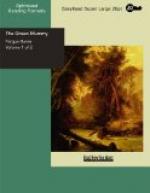“Why not on her guard?” persisted the Coroner wilfully.
“Rubbish! rubbish! rubbish! My mummy wasn’t stolen by a woman. What the devil would a woman want with my mummy?”
“Be more respectful, Professor.”
“Then talk sense, doctor,” and the two glared at one another.
After a moment or two the situation was adjusted in silence, and the Coroner asked a few questions, pertinent to the matter in hand.
“Had the deceased any enemies?”
“No, sir, he hadn’t, not being famous enough, or rich enough, or clever enough to excite the hatred of mankind. He was simply an intelligent young man, who worked excellently when supervised by me. His mother is a washerwoman in this village, and the lad brought washing to my house. Noting that he was intelligent and was anxious to rise above his station, I engaged him as my assistant and trained him to do my work.”
“Archaeological work?”
“Yes. I don’t wash, whatever Bolton’s mother may, do. Don’t ask silly questions.”
“Be more respectful,” said the Coroner again, and grew red. “Have you any idea as to the name of anyone who desired to obtain possession of this mummy?”
“I daresay dozens of scientists in my line of business would have liked to get the corpse of Inca Caxas. Such as—” and he reeled out a list of celebrated men.
“Nonsense,” growled the Coroner. “Famous men like those you mention would not murder even for the sake of obtaining this mummy.”
“I never said that they would,” retorted Braddock, “but you wanted to hear who would like to have the mummy; and I have told you.”
The Coroner waived the question.
“Was there any jewelry on the mummy likely to attract a thief?” he asked.
“How the devil should I know?” fumed the Professor. “I never unpacked the mummy; I never even saw it. Any jewelry buried with Inca Caxas would be bound up in the bandages. So far as I know those bandages were never unwound.”
“You can throw no light on the subject?”
“No, I can’t. Bolton went to get the mummy and brought it home. I understood that he would personally bring his precious charge to my house; but he didn’t. Why, I don’t know.”
When the Professor stepped down, still fuming at what he considered were the unnecessary questions of the Coroner, the young doctor who had examined the corpse was called. Robinson deposed that deceased had been strangled by means of a red window cord, and that, from the condition of the body, he would judge death had taken place some twelve hours more or less before the opening of the packing case by Braddock. That was at three o’clock on Thursday afternoon, so in witness’s opinion the crime was committed between two and three on the previous morning.
“But I can’t be absolutely certain as to the precise hour,” added witness; “at any rate poor Bolton was strangled after midnight and before three o’clock.”




